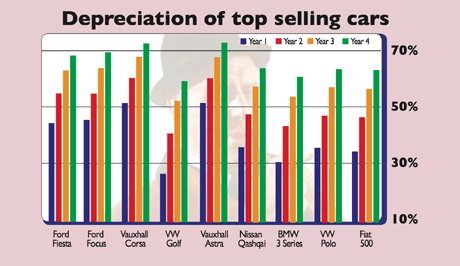
Cars can be expensive to run, there’s no getting away from that. The cost of filling your tank these days is enough to make most people wince. But there’s another motoring cost that you ignore at your peril. I’m talking about depreciation – the difference between what you pay for your car and what you end up selling it for. Along with fuel, it’s usually the biggest cost of running a car. But unlike fuel, you can actually do something about it.
UK sales of new cars are up by 5% so far this year, according to the Society of Motor Manufacturers and Traders (SMMT). Sales to private customers grew by nearly 24% in October alone and are up over 12% year-to-date. And I’m sure many of you know people who regularly buy new cars and trade them in for another new one after three years.
They don’t want to bother with things like MOTs and replacing tyres and brake pads. But the price you pay for avoiding these minor inconveniences is eye-wateringly high. Indeed, buying a new car borders on financial insanity.
You probably already know that you lose money as soon as you drive a new car off the dealer’s forecourt. But you might be staggered to realise just how much money you actually lose. I’ve had a look at the depreciation costs on some of the best-selling cars in the UK: the figures can only be described as frightening.
Take a look at the table above. By the end of your first year of driving, a typical Vauxhall Corsa or Astra will have lost more than half of its value. At the other end of the scale, a new VW Golf will lose a quarter of its value. After three years, the Corsa and the Astra will have lost two-thirds of their value with the Golf losing half.
But it’s when you translate that into hard cash terms that these costs really mount up. If you’ve got a big mortgage to pay off and a pension pot to build up, you should ask yourself: can you really afford to waste thousands on buying new cars?
You’re much better off buying second hand. But what should you consider when doing so? The severity of a car’s depreciation depends on several things: age, condition, mileage and brand are some of the main factors. It stands to reason that you should get more for a popular brand of car that has been well looked after and has low mileage, than for a battered banger with no service history.
Another factor to consider is how you sell your car when you want to get rid of it. Trading it in at the local dealer is convenient and hassle-free, but you will usually get a lot less for it than if you were to sell privately.
Broadly speaking, a car that is around four or five years old strikes a good balance between financial sanity and effort. It’s fair to say that these cars won’t have the bells and whistles of the latest models. They won’t have a manufacturer’s warranty either, and may have slightly higher maintenance costs.
But as long as you buy a car that’s been well looked after, then you’ll have a motor that can hopefully give you a good few years of reliable service, for up to 75% less than the cost of a new car.
On top of that, the amount you then lose each year from depreciation is more likely to be in the hundreds of pounds rather than the thousands. That gives you all the more to put towards your mortgage or your pension pot.
Tips to limit the cost of depreciation
1. Buy cars that are at least three years old, rather than brand new ones.
2. Ideally look for cars with relatively low mileage (averaging 10,000-12,000 miles per year or less). But be wary of cars that have unusually low mileage. Ex-fleet cars with high mileage can often run better than ones that have spent most of their time doing short journeys.
3. Do your homework so you don’t get caught out. There’s lots of information out there on what to look out for and how much to pay. Valuations of used cars are free on some websites or can be bought online for £3-£4. You can also check out magazines such as Parkers and Glass’s Guide.
4. Haggle to get the lowest possible price. It’s a buyers’ market at the moment. Sellers want to turn their cars into cash as quickly as they can.
5. Consider buying a diesel if you drive more than 10,000 miles a year, as it should pay off in running costs. Sought-after brands and cars with generally low running costs such as road tax are also more desirable and easier to sell on.
6. Look after your car and keep it regularly serviced.
7. Sell your car privately if you can. You will usually get a better price than if you trade it in at a franchised dealer.